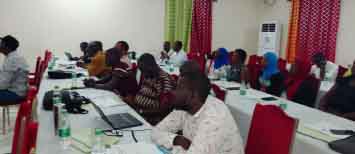By Isatou Jawara
The Ministry of Environment Climate Change and Natural Resources (MECCNR) through the OMVG Project organised a capacity building workshop for the OMVG field staff and the National Monitoring Committee (NMC) with the Local Coordination Monitoring Committee (LCMC). The training targeted key and relevant staffs in connection to Gender-Based Violence and sexual harassment, to enable them manage cases and enhance preventive awareness-raising at the community level.
This is part of a sub-regional training being conducted in Guinea Bissau, Guinea, Senegal, and The Gambia.
The Minister of Environment Climate Change and Natural Resources, Hon Rohey John Manjang, presided over the official opening ceremony.
In her remarks, the Minister said OMVG is involved in the exploitation of the resources of the river basins shared by its member states; namely The Gambia, Guinea Bissau, Guinea, and Senegal. She noted that the sub-regional project is the first of its kind in the sub-region, pioneered by former Presidents.
This training, she said, will map out quality data and analysis of GBV cases across the regions.
Madam Manjang opined that major development operations and the human and financial flows they generate around infrastructure are often likely to encourage gender-based violence (sexual exploitation and abuse, sexual harassment, abduction of minors, etc.) in the ENERGIE project areas.
“This hypothesis has been verified in the OMVG worksites and as such the OMVG took an explicit decision to encourage the institution (OMVG) to undertake capacity building of its management and coordination structures for optimal management, both preventive and curative, of gender-based violence, in particular, sexual violence against women and girls,” she noted.
The flagship activity of this project is the capacity building of the various stakeholders and relevant actors on GBV issues. A Senegalese NGO, RADI was contracted to oversee the training of the stakeholders in The Gambia, Senegal, Guinea Bissau, and Guinea, to reduce the likelihood of GBV, including Sexual Exploitation and Abuse (SEA) and Sexual Harassment (SH), or the consequences they could cause if they occur.
According to the Minister, these are grassroots structures that have a foothold in the project’s beneficiary communities and will be playing a pivotal role both in the dissemination of information and in the reception of sensitive complaints from victims of Gender-Based Violence (GBV). In addition, other structures will be involved in the training sessions to improve the involvement and the harmonised management of GBV in the OMVG energy project-affected communities and regions.

